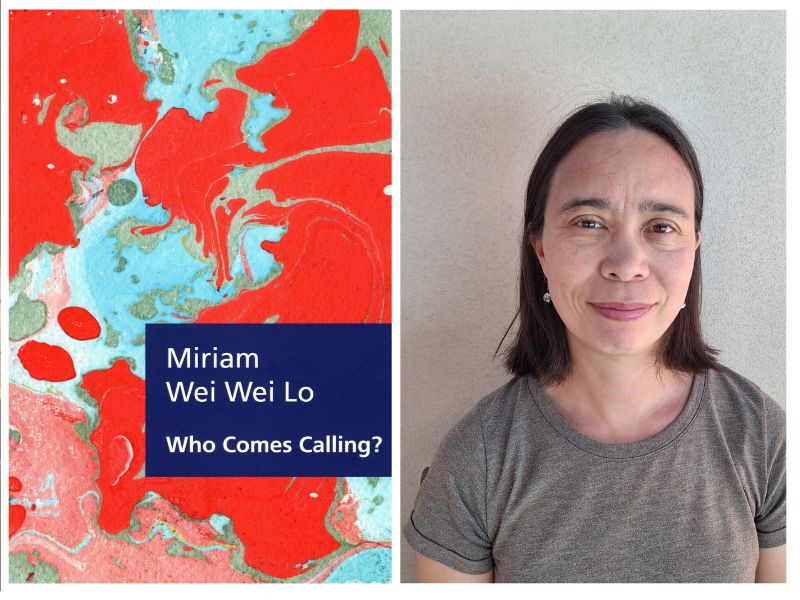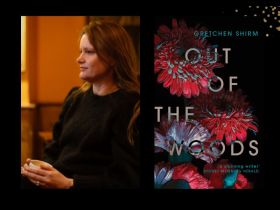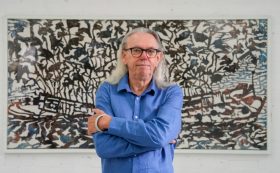Who Comes Calling? in subtle ways entices the reader to consider their own identity, faith and doubts against the artful background of poet Miriam Wei Wei Lo’s experience as a mother, immigrant and Christian. This is Lo’s second full-length poetry release following Against Certain Capture, which won the WA Premier’s Poetry Book Award in 2004.
Lo’s voice adds to the chorus of writers who, since the sexual revolution of the 1960s, have been writing about and recasting their roles as mothers and creatives. In Lo’s work she examines the life of the mother and creative artist ‘when my poetry practice was the five minutes I had to spare between folding the laundry and falling asleep’. Through lyric, narrative and ekphrastic free-verse poetry Lo examines these topics in ways that invite the reader into her world through intimate moments of motherhood and domesticity.
The poem ‘No Epidural’ after Sharon Olds’ ‘The Language of the Brag’ places Lo’s work within the feminist oeuvre of writing about the body and motherhood in realistic, rather than idealistic, ways, framing the birth of her ‘bird that breathes in the sea’. This lyric poem in five parts – arena, ocean, ballroom, inside and grandstand – pushes and pulls the reader as if they are on the ocean, encompassing the corporeal turbulent waves of birth that end with her ‘glistening prize’.
‘Ars Poetica’ is an outstanding poem that opens with the exquisite line, ‘Without the woman at the kitchen sink, / nothing is possible’.
Reframing feminism and the creative life within the realities of women’s domestic lives, stuck at the kitchen sink, yet dreaming of more, ‘She sings as she washes, remember her song’. In ‘What We See By’ she writes of the birth of her first child: ‘my heart is in my mouth looking at him / he is the sum of all our vulnerability and potential’. Lo reminds us that parenthood is a tenuous venture and the perfect foil for poets to explore the liminal regions of life’s experiences.
Immigrants allow us to see our own country from a unique insider/outsider point of view and Lo’s collection explores this expertly in poems such as ‘A Few Thoughts on Multiple Identity’ and ‘Home: One Day I Will Find It’. For Lo, home is an idyllic place to strive towards that does not exist in the present moment: ‘No children are raped there. / No one eats while others go hungry… / I will not have to lock the door’ (18). Lo’s insider/outsider view brings up questions such as: Where is home? What does it mean to be a mother with multiple ethnic identities?
Throughout the collection Lo sets her intent to examine her numerous identities, ‘Opening Australia’ addressing her Chinese-Malaysian and Anglo-Australian identity. For her, Australia is a place of possibility that ‘opened up / like a hand in my face, / certain things / unfolding, sure as fingers’, yet it is also a place where she sees herself ‘between the gaps’ of her fingers.
Being a secular society, many Australians may be reluctant to read poetry from a Christian point of view, yet Lo’s writing is entrenched in spiritual searching and questioning that draws in the reader, much like the work of contemporary poets Mary Oliver and David Whyte. Lo’s spiritual questioning is presented in a non-dogmatic and open-minded manner with the titular poem being the strongest example. Here she writes: ‘I did not want poems. What good / did a poem ever do me? How will / poetry feed my children?…/ My husband opened the door. This / could be from God, he said. The poem / came in…’
Like fellow West Australian, Tim Winton, Lo’s view of God is one deeply entrenched in personal experience and this poem beseeches us to draw connections between embracing writing, family, faith and a calling, each with no clear purpose in a capitalist economy.
It is in Lo’s questioning of human suffering, misogyny and violence that some of the strongest work shines through. ‘In Memory of Katrina Miles’ is a subtly rendered, heartbreaking poem in its portrayal of the death of her friend and children through domestic violence. The poem encompasses the beauty of friendship along with the immense loss and guilt felt when one loses a loved one to the incomprehensible act of domestic violence. For although Lo says ‘yes to The Gifts of Imperfection’ she also ‘want[s] my life to be perfect. I do not want to have these bullet-holes. I do not want a world where a husband can batter his wife behind closed doors while their children scream and cry…’ (54). The poem ends poignantly with Lo’s dream of one day returning the metaphorical book, The Gifts of Imperfection, back to her deceased friend.
This collection asserts Lo’s position as a writer, mother, feminist and person of faith, asking us to see and embrace her as a multifaceted artist. In an early poem ‘A Few Thoughts on Multiple Identity’ she reflects on a childhood experience of writing ‘a poem about a paper doll made of a lot of different scraps and pieces who stayed stuck together by sheer force of will’, yet it is clear as we read on that these ‘sharp and jagged’ pieces are now held together like a collage, somewhat imperfect; however, pieced together in a more refined and artful manner.
Read: Book review: The Rewilding, Donna M Cameron
Who Comes Calling? is a deft, thought-provoking collection that leaves us revelling in the many and varied gifts of multiple identity, motherhood and human imperfection.
Who Comes Calling? by Miriam Wei Wei Lo
Publisher: WA Poets
ISBN: 9780645517859
Format: Paperback
Pages: 90pp
Release date: May 2023
RRP: $25





